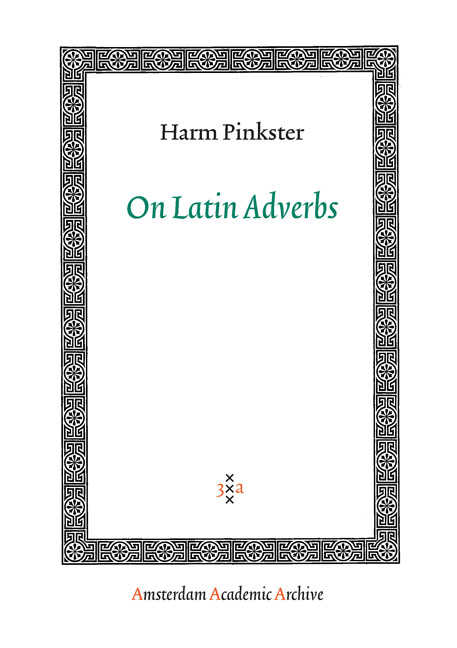Book contents
- Frontmatter
- Preface to this Edition
- Preface
- Contents
- Introduction
- 1 General Problems of Studying a Dead Language
- 2 Problems of Classification
- 3 Adverbs in Roman Grammatical Theory
- 4 The Adverb in Latin Linguistics
- 5 Adverbs as Derived Forms
- 6 Syntactic Problems
- 7 Subclassification of Adverbs
- 8 Adverbs and other Invariables
- 9 The Relationship Between Adverbs and Prepositions
- 10 Adverbs and Connectors
- 11 Adverbs and Subordinators
- Bibliography
- Indices
- Index Auctorum
- Titles Published in the Aaa Series
- Frontmatter
- Preface to this Edition
- Preface
- Contents
- Introduction
- 1 General Problems of Studying a Dead Language
- 2 Problems of Classification
- 3 Adverbs in Roman Grammatical Theory
- 4 The Adverb in Latin Linguistics
- 5 Adverbs as Derived Forms
- 6 Syntactic Problems
- 7 Subclassification of Adverbs
- 8 Adverbs and other Invariables
- 9 The Relationship Between Adverbs and Prepositions
- 10 Adverbs and Connectors
- 11 Adverbs and Subordinators
- Bibliography
- Indices
- Index Auctorum
- Titles Published in the Aaa Series
Summary
Intention
This study deals with a number of aspects of the words which are usually called adverbs in Latin. It contains on the one hand a critical discussion of their treatment in Latin grammatical studies - the characteristics attributed to them, their relationship to other words - and on the other hand a discussion of the conditions that have to be met in order to achieve a better (sub)classification - general problems of classification as well as criteria for effecting such classification - and a better description of the functions of adverbs in larger constructions. The study contains, therefore, both language- specific sections and more general ones. I have tried to write the passages specifically dealing with Latin in such a way that they are clear enough to the non-Latinist, the more general passages in such a way that they are understandable for Latinists who are not acquainted with recent developments in linguistics. I can only hope that I have avoided the risk of being either obscure or trivial to both groups of readers.
Surveyo[the content
The book consists of three parts. The first deals with general problems. The second part (ch. 3-7) contains a discussion of the class of Latin adverbs, the criteria used to define them and a discussion of a new means of achieving a subclassification. In the third part (ch. 8-11) I deal with the relationship between adverbs and other so-called uninflected words with respect to syntactic behaviour. Clearly, a fourth part might have been added dealing with the syntactic characteristics of adverbs and other constituents (such as ablative case forms ‘of nouns, prepositional phrases, subordinate clauses) which are often called ‘adverbial adjuncts', ‘adverbials', etc. Such a study would require to be of considerable length and exceed the bounds of a dissertation. It is my intention, however, to devote a separate monograph to this subject.
The general problems dealt with in part one concern the nature of the material we have to work with (ch. 1) and classificatory problems (ch. 2). I will expound the idea that the work of the Latin linguist is seriously hampered by the fact that it has to be based on a closed corpus, which has been selected to a large extent as a result of literary and other not primarily linguistic factors. On the other hand the linguist's work may be facilitated by his knowledge of general linguistic facts.
- Type
- Chapter
- Information
- On Latin Adverbs , pp. 1 - 8Publisher: Amsterdam University PressPrint publication year: 2005

